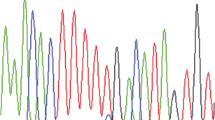Abstract
The tumour suppressor gene p53 has been found to be mutated or inactivated at high frequency in several common human tumours. We have examined a series of exocrine pancreatic carcinomas for over-expression of mutant forms of p53 by immunohistochemistry with a panel of specific antibodies. We found immunodetectable p53 in 13 of 22 (60%) frozen pancreatic cancers and seven of 13 pancreatic cell lines. One of the antibodies, CM1, recognises p53 in formalin-fixed, paraffin-embedded archival material and using this reagent we found immunodetectable p53 in 28 of 124 (23%) pancreatic cancers. We have successfully demonstrated the presence of point mutations by direct sequencing of genomic DNA extracted from archival tissue showing CM1 immunoreactivity. We conclude that p53 activation is an important event in human pancreatic tumorigenesis and that the CM1 antibody can detect a proportion of cases of overexpression of mutant p53 in archival pathological material.
Similar content being viewed by others
Author information
Authors and Affiliations
Rights and permissions
About this article
Cite this article
Barton, C., Staddon, S., Hughes, C. et al. Abnormalities of the p53 tumour suppressor gene in human pancreatic cancer. Br J Cancer 64, 1076–1082 (1991). https://doi.org/10.1038/bjc.1991.467
Issue Date:
DOI: https://doi.org/10.1038/bjc.1991.467
- Springer Nature Limited
This article is cited by
-
Selective epigenetic alterations in RNF43 in pancreatic exocrine cells from high-fat-diet-induced obese mice; implications for pancreatic cancer
BMC Research Notes (2024)
-
The impact of the human microbiome in tumorigenesis, cancer progression, and biotherapeutic development
BMC Microbiology (2022)
-
Major histocompatibility complex class I molecule expression by pancreatic cancer cells is regulated by activation and inhibition of the epidermal growth factor receptor
Immunologic Research (2022)
-
Protein interaction network and drug design of stomach cancer and associated disease: a bioinformatics approach
Journal of Proteins and Proteomics (2021)
-
The microbiota and microbiome in pancreatic cancer: more influential than expected
Molecular Cancer (2019)




